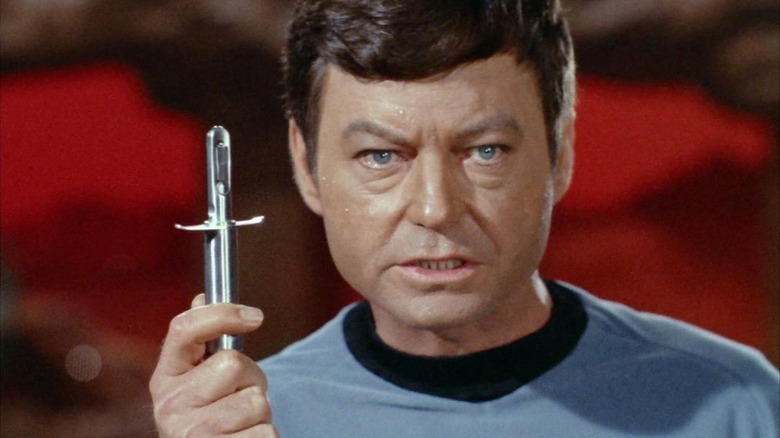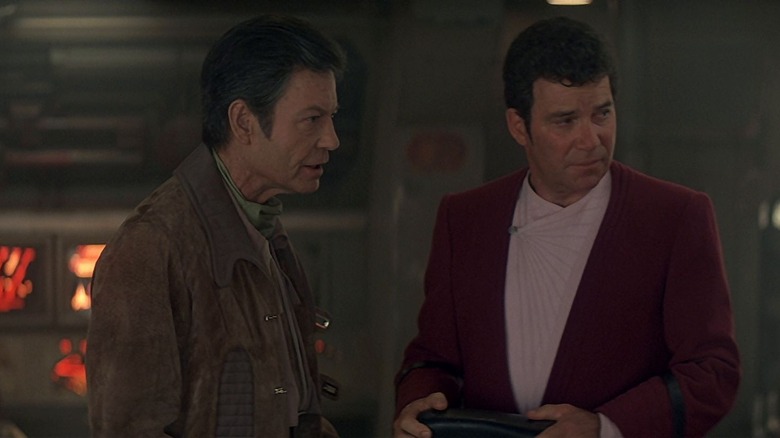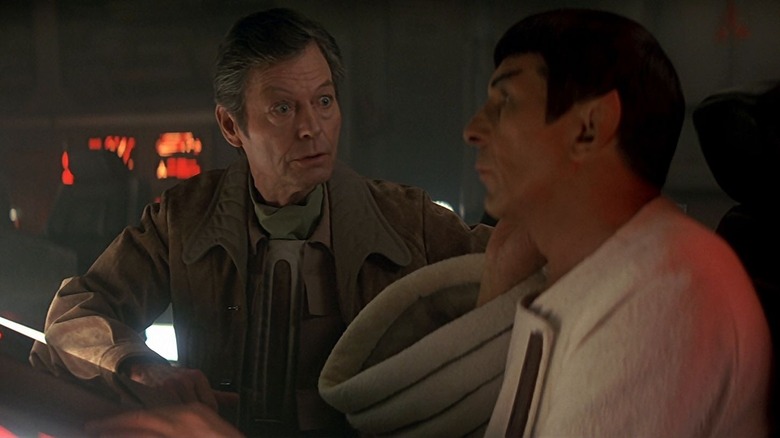Why Star Trek Was A 'Mixed Blessing' For DeForest Kelley
"Star Trek" is a dream gig, but it can also be a nightmare. Brent Spiner, who played the android Data on "Star Trek: The Next Generation," spoke to TV Guide in 1994 about how he will always be Data in the eyes of the public. He could win an Oscar for playing an elderly woman, he said, and still die knowing that Data would be listed first in his obituary. "Star Trek" is such a powerful force in the pop cultural zeitgeist that playing a "Trek" character can mark an actor forever; it must have been hard to walk away from "Star Trek," walk into another audition, and hear "Hey! It's Chekov!" or "Do the Riker thing!"
This was certainly experienced by DeForest Kelley a prolific TV actor and well-known pop culture heavy prior to "Star Trek." Gene Roddenberry already knew Kelley in the early '60s after the pair worked on a few TV shows together, notably the lawyer show "333 Montgomery." When it came time to cast Dr. Leonard McCoy, the chief medical officer on the U.S.S. Enterprise, Roddenberry knew just who he wanted.
After "Star Trek" ended in 1969, however, Kelley's gigs slowed. From 1969 to 1981, Kelley only had 10 non-"Star Trek" roles. In contrast, Kelley acted in 14 TV roles in 1959 alone.
In 2014, StarTrek.com unearthed a rare audio interview with Kelley taken on the set of "Star Trek IV: The Voyage Home" in 1986. In that interview, Kelley was frank about how "Star Trek" brought him into the public eye, but also that it kind of damaged his career. He was grateful, of course, and Kelley wanted to stress that intense gratitude, but he also noted that playing Dr. McCoy was like being caught in a trap.
Hollywood's faculty for pigeonholing
The interviewer noted that Kelley spent a large portion of his career playing tough guys and villains. Kelley retorted that studios are uncreative places when it comes to casting and that many actors are pigeonholed and typecast very quickly. "Hollywood," he said, "has an unhappy faculty for putting someone in a slot." He said that no casting agent was able to take his whole career into perspective, noting that he was capable of a lot more than villains. Later, people would forget that he was capable of a lot more than playing Dr. McCoy.
He also assumed that "Star Trek" wouldn't be an opportunity to be typecast because his two co-leads, William Shatner and Leonard Nimoy, played such fantastical outsize characters. Compared to them, McCoy was "plain." In short, he felt they would draw attention away from him. The actor said:
"[...] McCoy was most-human character in the whole group. I did not feel that way about Bill or Leonard. The captain, you think about 'Flash Gordon' or that sort of thing. And when I saw Leonard with his makeup, with the ears, I thought, 'Well, he's had it.' I thought, 'McCoy is still kind of an ordinary human being walking around out there and I don't think there will be any problems at all.' I was the most surprised man in the world when I was caught right in the same trap ... if you can call it a trap."
Kelley felt that by being "human," he could move to another gig easily. Ironically, when "Star Trek" gained cult popularity during reruns in the early 1970s, and Kelley's face graced TV screens more and more, humanity began to fall away.
Not the most driven actor
As mentioned, though, Kelley wanted to communicate that he appreciated the fame "Star Trek" brought him and that he was able to play one character for many, many years. He said:
"It's been a mixed blessing. I've enjoyed the role tremendously and, as the years have gone by, I have considered myself very fortunate to be a part of this show, which has become the phenomenon that it has. Many actors never get the opportunity to even be in a successful series, and here I have had the opportunity to be a part of what has become something most unusual in this country. So I have to look at it with all gratefulness."
Kelley then admitted that his unvaried, post-"Star Trek" career was partially his own doing. " I'm not the most driven actor in the world," he said. "I'm a lazy actor." He said he was perfectly content to take the gigs he landed and rarely fretted about his career beyond. What's more, "Star Trek" likely made him wealthy, through residuals as well as a long string of convention appearances. Although he felt he could have acted in a wider variety of roles, he was okay with playing Dr. McCoy. "Not that I was setting the world on fire," he added, "but I had fulfilled myself within."
Kelley passed away in 1999 at the age of 79. His final role was voicing the space probe Viking 1 in the 1998 animated film "The Brave Little Toaster Goes to Mars."


